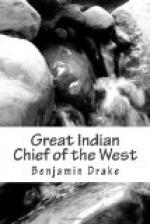With this sketch of the last days of Black Hawk, our narrative of his life is closed. After an eventful and restless career of “three score and ten years,” this celebrated Sac has been “gathered to his fathers.” His name cannot be forgotten, for his deeds are a part of the history of this country. If not distinguished for a high order of talent, or renowned for great warlike achievements, he has not often been surpassed in the history of his race, for those less dazzling virtues, humanity, courage, and love of country. “He was an Indian who had a sense of honor, as well as policy; a man in whom those who know him confided."[15] In the last speech which he made in the last year of his life, in alluding to his difficulties with the whites, he says, “Rock river was a beautiful country—I liked my towns, my cornfields, and the home of my people;—I fought for it,”—a declaration as creditable to the heart of the speaker, as it is important to a just estimate of his conduct, in resisting the removal of his tribe from their native land. The love of country is not confined to civilized life, but swells the heart and nerves the arm of the untutored man of the woods. “I LIKED MY TOWNS, MY CORNFIELDS, AND THE HOME OF MY PEOPLE;—I FOUGHT FOR IT,” should be inscribed over the humble grave of Black Hawk.
* * * * *
NOTE.—Since writing that portion of the foregoing narrative which treats of the causes of the late war with the Sacs and Foxes, the following article, from the able pen of judge Hall, has met our observation. It was published in the Western Monthly Magazine in 1833, one year after the termination of that conflict. The writer was then a resident of Illinois, and intimately acquainted with the relations existing between the whites and Indians. His remarks are valuable. They embrace a graphic description of the region inhabited by the Sacs and Foxes, and fully sustain the position which we have taken in this volume, that the “Black Hawk war” was the result of unprovoked agressions made by the American people upon the Indians.
“I have just returned from a delightful voyage. I have explored a portion of the exquisitely beautiful shores of the upper Mississippi; and am ready to confess that until now, I had little idea of the extent, the grandeur, or the resources of the west. The world cannot produce such another country as this great valley of ours. Yet to understand its value, one must ascend the Mississippi and the Illinois, and see the noble prairies of the two states which are destined to eclipse all others. I cannot convey to you in adequate language, my admiration of this attractive region. The traveller who visits the western country, and fancies he has acquired any knowledge of it—I say any, by simply tracing the meanders of the Ohio, or spending weeks, or years, if you please, at Cincinnati or Louisville, is very much mistaken. There is much to




